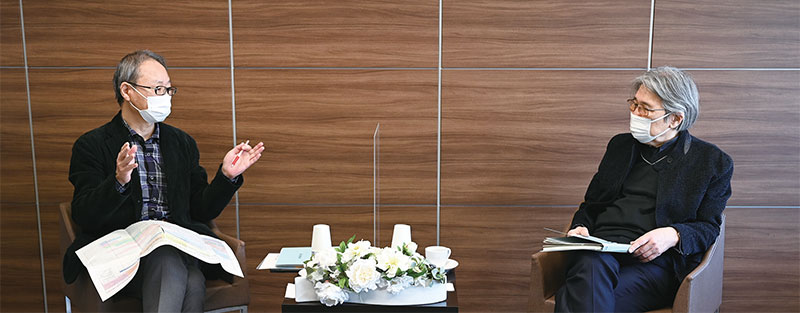
20 years of RISTEX
Dialogue #2
MURAKAMI Yoichiro X KOBAYASHI Tadashi
MURAKAMI Yoichiro had been involved in the establishment of RISTEX (System) which later became RISTEX (Center), and acted as the Program Supervisor for Social System & Social Technology Theory, one of the earliest funding programs, and later, for Science Technology and Humanity program. He contributed to the establishment of a style characteristic to RISTEX, that is challenging tangible social issues by co-creation between researchers and stakeholders, and simultaneously furthering relevant theoretical consideration regarding science, technology and society. These programs have derived further R&D schemes, talents, and a management style which have been passed on to later programs. In this dialogue, the history of STfS was looked back by him and the Director-General of RISTEX, KOBAYASHI Tadashi, who had participated in a project funded in Social System & Social Technology Theory and served as the Assistant Program Supervisor in Science Technology and Humanity.
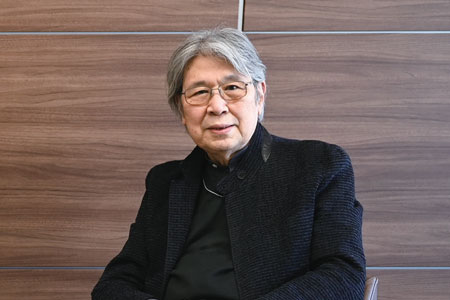
MURAKAMI Yoichiro
Served as the Director of the Research Center for Advanced Science and Technology, the University of Tokyo, and the President of Toyo Eiwa University. Currently he is a professor emeritus at the University of Tokyo, and International Christian University, the Director of the Center for Next-Generation Civilization at Toyota Technological Institute, and Deputy President of the Aspen Institute Japan. He has numerous publications including: Questioning Science at Present, 2000; Science of Safety and Security, 2005; What Is Science to Humanity?, 2010; Living in the Post-Corona World, 2020; and Who Is the Expert?, 2022 (all in Japanese).
What Were Discussed at the Birth of 社会技術 (S&T for Society: STfS)
KOBAYASHI Tadashi (KT): 20 years ago, RISTEX (System), the predecessor of current RISTEX, was established. It is a privilege to look back the past 20 years with Professor Murakami. Then I was a member of a project led by FUJIGAKI Yuko*1 in Social System & Social Technology Theory, a funding program by RISTEX (System), of which Program Supervisor was you. In a subsequent program, Science Technology and Humanity, which started after the restructuring of RISTEX, I worked side by side with you in its management as you were the Program Supervisor and I was the Assistant Program Supervisor. So in total, you served as the Program Supervisor for 12 years, which is astonishing! First of all, I would like to ask you about the birth of RISTEX (System) 20 years ago. If I remember correctly, you were a member of the Study Group on the Promotion of R&D of S&T for Society, which prompted the establishment of RISTEX.
MURAKAMI Yoichiro (MY): Yes. At the committee, we discussed whether the term 社会技術 was meaningful in the first place (as it is a neologism). While it is important to develop technologies that bring changes to society, it is also important for these to be implemented, and for this purpose experiments need to be performed in the social setting, but such experiments are intrinsically different from those in the lab - as they unavoidably influence the actual society however little it may be. To what extent is that acceptable? Or should it be acceptable at all? The discussion expanded and we covered numerous fundamental questions.
KT: The report of this committee was released in 2000 - 20 years has past but what it says is still relevant today.
MY: Then there was an urge to give rise to a concept that was brand new as there had been a series of nuclear accidents and related scandals.
KT: In the report, the "characteristics of社会技術shakai-gijutsu and challenges of R&D promotion" are described as "(1) technologies aimed to solve social problems, (2) technologies attainable by the integration of natural sciences and social sciences and humanities, and (3) technologies on which the market mechanism has little impact." These expressions are still used in the description of current RISTEX.
MY: That (2) is important in achieving (1) is the core message here - since a society consists fundamentally of people, we cannot neglect the contributions of research about people and society.
KT: In the description of the principle of 社会技術, it is stated that knowledge has become fragmented in the process of S&T advancement and thus is losing ability to view comprehensively what is going on. I think this still applies today. That is why social issues need to be challenged with research that is open to society.
MY: Yes. Then science, technology and society (STS) was already established overseas as an academic discipline that focused on issues related to S&T and society, but Japan was still in the early phase of setting up an academic society for STS.
*1 "Public Technology Governance: Towards the Construction of Social Technology Theory" project
Funding Programs: Social System & Social Technology Theory and Science Technology and Humanity
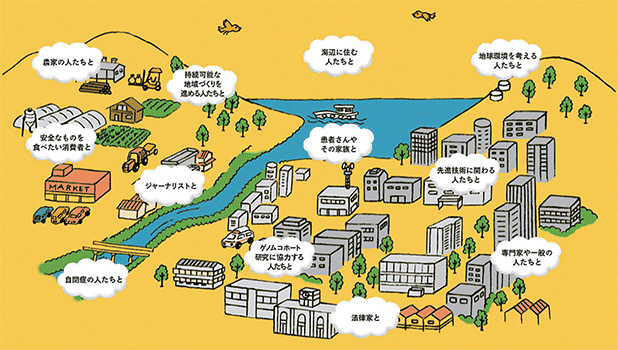
Website of 'Interaction Between Science, Technology and Society' subprogram of Science Technology and Humanity R&D program
KT: I would like to hear about your experience as the Program Supervisor, firstly, of Social System & Social Technology Theory.
MY: There were many interesting projects, such as the project led by WATANABE Yutaka.*2 He looked into the problem of trailer trucks loaded with imported container cargo rolling over on curves, even at a speed below the legal limit. In the worst case, the fall resulted in the death of a pedestrian. So he tried to deal with this problem, and carried out experiments using the actual truck.
KT: It was a practical R&D of a system which detects the truck's center of gravity, so it had an immense social impact. Later on, the Ministry of Land, Infrastructure, Transport and Tourism issued a handbook on the safe transportation of imported containers, which included a measure against such accidents, so the system developed in this project became no longer needed. But perhaps this project had an indirect influence by raising the social awareness of this issue, so it is difficult to evaluate the project's impact appropriately. What about the subsequent program, Science Technology and Humanity? I remember many on-site visits and research retreats.
MY: We also organized an international conference. There was a great variety of projects and that was very interesting. For example, in the project led by a lawyer, NAKAMURA Tamiko,*3 it was expressed that the court was a place to determine the winner and the loser, rather than a place to seek the truth - I never thought of it that way, so it astonished me.
KT: I too remember it clearly. When lawyers who possess such an interest collaborate with scientists who seek truth in a project together, the difference in problem recognition due to disciplinary differences becomes vivid. Also, we needed to contemplate what was at stake, that is, winning at the court by skillfully using science, and how to handle uncertainty associated with science.
MY: When you think about it, there is uncertainty in most of the problems in our society today, like COVID-19.
KT: I agree. In the case of COVID-19, what scientists were saying last year is completely different from what they claim now, but that is not because they were wrong then. They are merely trying to figure out what is happening but there is always uncertainty associated with scientific investigation.
MY: Hence the importance of focus on uncertainty, to this day. Global warming is the same, is it not.
KT: Talking about uncertainty, it reminds me of the complexity and difficulty we had to face when the Great East Japan Earthquake hit just before Science Technology and Humanity program ended. Besides, it is very important to gather research outputs and analyze them for the production of meta-knowledge after projects have ended. Or to continue discussions and examinations in order to review or update existing knowledge. Sadly though, it is yet difficult to secure a budget for such meta-analyses and activities in Japan. Some researchers are willing to do so, but there hardly is a lasting system in which they can engage in such activities autonomously. This is probably a problem of funding.
MY: Why don't you start a new program with that as the research theme? Research of funding agencies by a funding agency. That would be an important meta investigation. I think RISTEX is about the only funding agency which can put it in practice.
KT: That is intriguing. Incidentally, RISTEX has been funding R&D in science, technology and society after the two programs you supervised: Human-Information Technology Ecosystem (HITE) and Responsible Innovation with Conscience and Agility (RInCA). The latter is a program that looks at ethical, legal, and social issues/implications (ELSI) and responsible research and innovation (RRI) of emerging science and technology. In these programs, some, if not many, researchers who gained experiences and networks that were built in your programs are indeed flourishing. Looking around, we notice that it is becoming increasingly more common to require publicly-funded large-scale research projects to appropriately address ELSI, especially if they are aiming for social implementation that could have a significant social impact.
MY: Yes. I am currently in charge of organizing Aspen Seminars*4 in which leaders of various industries, and sub-top talents from corporations are invited to read and discuss classic texts, and I find them very keen to discuss corporate governance and corporate ethics. When I talk to them about ELSI, they immediately understand the idea. So in a sense, the notions of ELSI and RRI are gaining more recognition in society, which makes me feel that such ways of thinking and dealing with potential social impact is surely being nurtured.
*2 "Creating Safe Logistics in an Import-Dependent Society" project
*3 "Legal Decision-making under Scientific Uncertainty" project
*4 Seminars organized by the Aspen Institute Japan in which leaders and future leaders in various sectors engage in intense dialogue regarding the reading of classic texts.
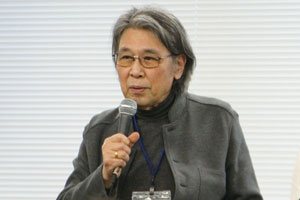
As the Program Supervisor for Science Technology and Humanity (2014)
Importance of Problem-Setting from a Wide Perspective and Highly Abstract Discussions
KT: The other day, I learned from my friend the term 'public understanding of philosophy.' Apparently, Angie Hobbs, a researcher of ancient philosophy at the University of Sheffield, UK, was appointed to a position titled so. I don't think such a concept would come about in Japan.
MY: What a skillful expression that is. While we know that 'public understanding of science' was an important framework in the consideration of science, technology and society, particularly in 1990s' Britain, I didn't know about such an intriguing derivative.
KT: I also hear that the UK Research and Innovation (UKRI) has set up a funding scheme called Trustworthy Autonomous Systems (TAS) Hub. What should be taken into account in order to realize a trustworthy autonomous system? - this is the grand research question they set. Then, a wide range of topics fall under this umbrella, including autonomous driving, robots, avatars, and even computational finance. This enables them to conduct research at a more abstract level, without being bound to individual technologies.
MY: Perhaps such abstractness is not as highly regarded in Japanese research culture.
KT: It tends to be expressed negatively such as 'hard to understand' and 'ambiguous.' But after all, is it not Japan that ends up being stuck in the very narrow competitions of individual spec improvement within a ready-made system that comprises of overseas discourses and concepts.
MY: Then, it may be possible to say that continuing to have poor meta perspectives is in a sense detrimental to the benefit of the nation. I think such philosophical consideration needs to be thoroughly scrutinized especially when we consider the positioning of Japan in the global society. The key lies in how bad we are at looking at things from meta perspectives. This is a crucial impediment.
KT: To approach from meta perspectives is exactly what we have been pursuing in our specialty, that is, history and philosophy of science, and STS.
MY: In the University of Tokyo where we were, the courses provided by the Department of History and Philosophy of Science were a part of liberal arts education, and I would think amateurism was its philosophical attitude. That is, to regard free speech as a fundamental value, and historically speaking, it was originally outside of academia but became specialized into a discipline. There are many outstanding researchers, but perhaps they are not so distinctively making contributions from meta perspectives. When the Japanese Society for STS was established, I remember asking them not to place too much weight on publishing academic papers. Nevertheless, academic research conduct is unavoidably inclined towards production of papers as experts. There seems to be certain reluctance towards stepping back and grasping the issue from a different perspective.
KT: I understand. And that seems to result in many researchers backing off from problems that go beyond their specialties, as they are 'out of their scopes.' There certainly are more experts but do we have more intellectuals? Policymakers too are increasingly more aware of the necessity of ELSI, which is good, but there also is a criticism against such a trend, claiming that it waters down the critical mindset that was fabricated in the notion of ELSI. A balance between these two is extremely difficult.
MY: What industries and policymakers refer to as ELSI now is not the same thing as the ELSI which have been discussed in such a manner, is it?
KT: No. I think with the changes in the nature of S&T in society, the establishment is beginning to pronounce that ELSI is important, as a gesture to acknowledge the new approaches and significant changes in addressing such a matter.
MY: When the S&T Basic Law was enacted, it excluded social sciences and humanities (SSH), but this was amended recently, and science, technology and innovation (STI) policy has shifted to actively seek collaboration with SSH. As SSH is now positioned as essential in the promotion of STI, this phenomenon needs to be examined from a meta perspective. In that sense, perhaps we should consider, say, 'public acceptance of humanities.' In other words, we ought to really comprehend the importance of humanities in the public world.
KT: Meanwhile, there always exist some science students who are interested in issues related to social aspects and ethics of science.
MY: Yes. But many graduate schools in S&T regard them like dropouts although they are indeed precious talents.
KT: I agree. I think it is important to secure at least one lab that looks into such topics in science departments because then, such students can reach us, and perhaps we can secure future researchers of STfS.
MY: It would be ideal if the same from SSH is possible, but I think that is much harder. It seems more practical to start by building a career path from sciences. To go even further, we may no longer need to restrict our scope to the conventional S&T if we were to seriously consider the future of STfS. If 'public understanding of philosophy' is a valid framework, I'm sure 'SSH and society' can be a topic of STfS. This dialogue made me realize this, so I shall note it for future consideration. When engaging in STfS, or more generally, something that would make better the society, perhaps we must consider the relationship between society and 'scientia,' the original Latin word for science that means knowledge as a whole.
(at Tokyo, December 21, 2021)
| 20 Years of RISTEX / S&T for Society TOP >>> | 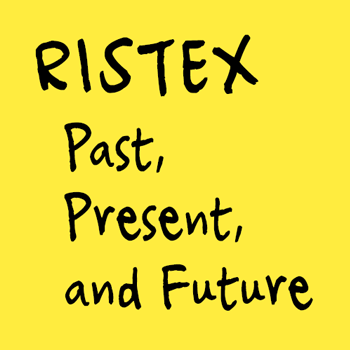 |